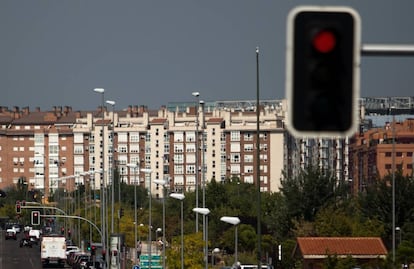Spanish government planning measures against owners of empty homes
Prime Minister Pedro Sánchez wants to draft national legislation to recognize the social role of housing and combat speculation

The Spanish government is planning “coercive measures” against the owners of empty homes, according to an internal report to which EL PAÍS has had access.
In a bid to regulate housing “as a public service in the general interest,” the Socialist Party (PSOE) government has drafted a set of initiatives that would affect property owned by banks and developers, but also private citizens. The measures are part of a report by the Housing Secretary General’s Office, which says they must now be elevated to national law.
There are cases where a regional government has sold public housing to investment firms
There are an estimated 3.4 million homes lying empty in Spain, according to a 2011 census by the National Statistics Institute (INE), the latest available. “Mobilizing” this pool of property has become one of the main goals of Spain’s Public Works Ministry.
Prime Minister Pedro Sánchez, who leads a minority government, wants to build enough consensus to start drafting a national housing law. But his weak position in Congress and the 2020 deadline for new national elections will complicate the initiative. And regional governments currently have the biggest say in housing policies, leading to diverging approaches to the problem of affordable housing.
As an alternative, Sánchez has suggested forging a national agreement among parties to foment an adequate supply of housing in Spain. “I am calling on all political forces to reach a pact that will turn housing into a citizen right, far from speculation,” Sánchez wrote last week via Twitter.
In a report dated September 11 and presented to the Cabinet, the ministry insisted on the need for a national law to end the current discrepancies stemming from different criteria followed by the various regional governments of Spain. Only this, said the report, can end the situation of “inequality.”
Some regions currently apply sanctions against the owners of empty homes
Some regions currently apply sanctions against the owners of empty homes. Forced renting and temporary expropriation are also options in some cases. The targets of these measures also vary: in some places only banks holding repossessed homes can be sanctioned, while in other regions, private individuals are also being targeted.
And there are also instances where a regional government has sold off public housing to investment firms. At the height of the economic crisis, Madrid regional and local authorities sold 5,000 public housing units to Goldman Sachs and Blackstone, who raised the rent and evicted anyone who could not pay.
Meanwhile, the Spanish courts are beginning to recognize the social role of public housing. A Madrid court recently accepted an appeal filed by a group of citizens against the sale of 2,935 apartments owned by the former Madrid Housing Institute (Ivima) to the investment fund Encasa Cibeles. And in May, another Madrid court said that these projects “serve a social purpose.” Both rulings found that the sale of public housing violated “the principles of family protection, protection of minors, and the right to adequate housing.”
The government’s strategy includes changes to the National Housing Plan, the tool that would allow the state to have an influence over powers that currently reside with regional administrations. The current plan treats private and public developers equally, and establishes a 25-year protection period for housing that’s been built with public funds. Under the planned new system, this period would be extended and subsidized housing would never lose the purpose for which it was built.
The public works minister, José Luis Ábalos, listed some of these measures in July at a congressional appearance where he also said that rental leases would be extended from three to five years to give tenants greater stability. Abalos announced plans to build 20,000 homes in high-demand areas where rising rent is forcing out working and middle-class tenants.
English version by Susana Urra.
Tu suscripción se está usando en otro dispositivo
¿Quieres añadir otro usuario a tu suscripción?
Si continúas leyendo en este dispositivo, no se podrá leer en el otro.
FlechaTu suscripción se está usando en otro dispositivo y solo puedes acceder a EL PAÍS desde un dispositivo a la vez.
Si quieres compartir tu cuenta, cambia tu suscripción a la modalidad Premium, así podrás añadir otro usuario. Cada uno accederá con su propia cuenta de email, lo que os permitirá personalizar vuestra experiencia en EL PAÍS.
¿Tienes una suscripción de empresa? Accede aquí para contratar más cuentas.
En el caso de no saber quién está usando tu cuenta, te recomendamos cambiar tu contraseña aquí.
Si decides continuar compartiendo tu cuenta, este mensaje se mostrará en tu dispositivo y en el de la otra persona que está usando tu cuenta de forma indefinida, afectando a tu experiencia de lectura. Puedes consultar aquí los términos y condiciones de la suscripción digital.








































